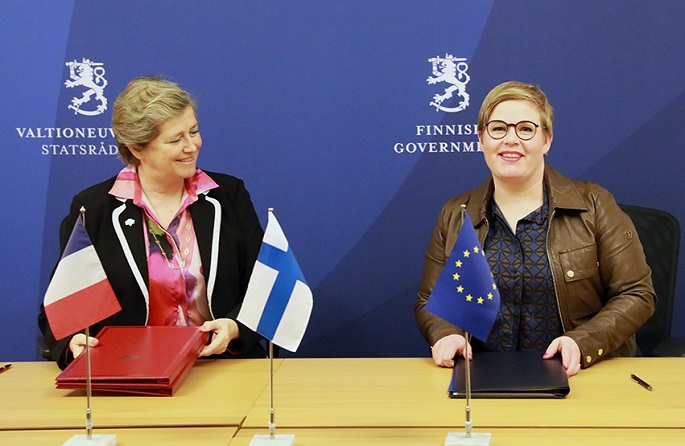Finland, France sign new tax treaty
Published : 05 Apr 2023, 22:34
Finland and France on Tuesday signed a new tax treaty with the view to eliminate double taxation with respect to income taxes and prevent tax evasion and avoidance, said the Ministry of Finance in a press release.
Minister of Finance Annika Saarikko and French Ambassador Agnès Cukierma signed the treaty for their respective countries.
The tax treaty was originally signed in 1970. Attempts were made to update it in the 1980s and 1990s, but these failed due to differing views on the allocation of the right to levy taxes on pensions. The treaty was outdated in many respects and was no longer in line with the OECD Model Tax Convention or Finland’s tax treaty policy.
Negotiations on the treaty were resumed in 2019, and Finland and France signed the new treaty on 4 April 2023.
The entry into force of the treaty still requires that Parliament approve the treaty and enact an act bringing the treaty into force.
The treaty will particularly change the taxation of pensions earned from organisations outside the public sector.
Under the new treaty, Finland will be able to tax pensions paid from Finland to France earned during employment with organisations outside the public sector.
In these cases, double taxation will exceptionally be eliminated by the source country. In other words, if a person living in France is paid a pension from Finland, the tax paid on this pension in France will be deducted from the tax to be paid on it in Finland.
The 1970 treaty will continue to be applied to people who lived in one of the treaty countries while receiving a pension from the other at the time the new treaty was signed. The pensions of such people will only be taxed in their country of residence.
The treaty also changes how dividends from portfolios of shares are taxed. Under the new treaty, the source country has the right to collect a 15 per cent tax at source on dividend income from portfolios of shares. The treaty also changes the method used to eliminate double taxation from the exemption method to the credit method, which is in line with Finland’s current tax treaty policy.
In addition, the treaty includes a permanent establishment article based on the latest OECD Model Tax Convention.
This is the first time that this form of permanent establishment article has been included in a tax treaty concluded by Finland. The article in question is one off the products of the framework on base erosion and profit shifting (BEPS) launched by the OECD and G20.


